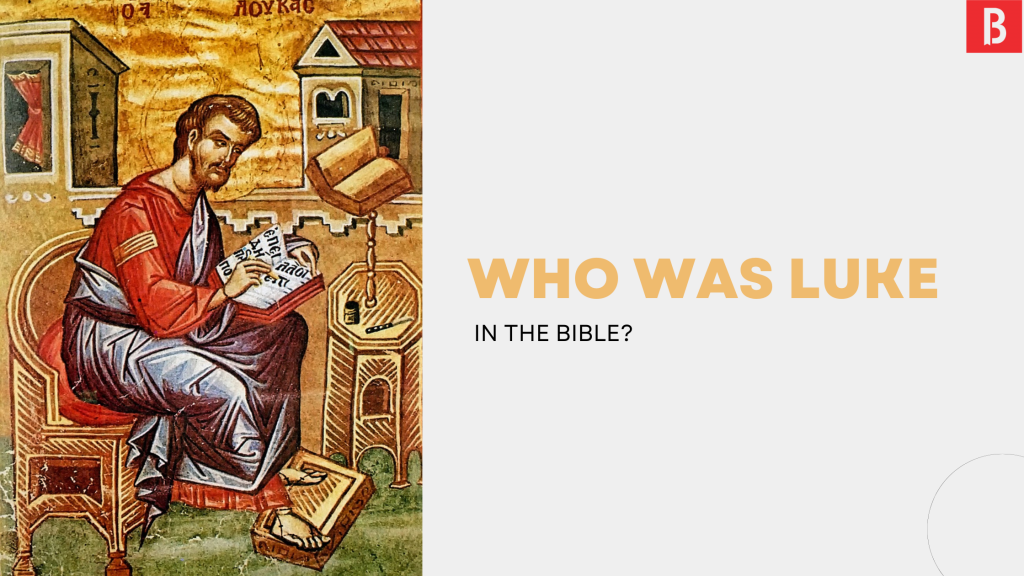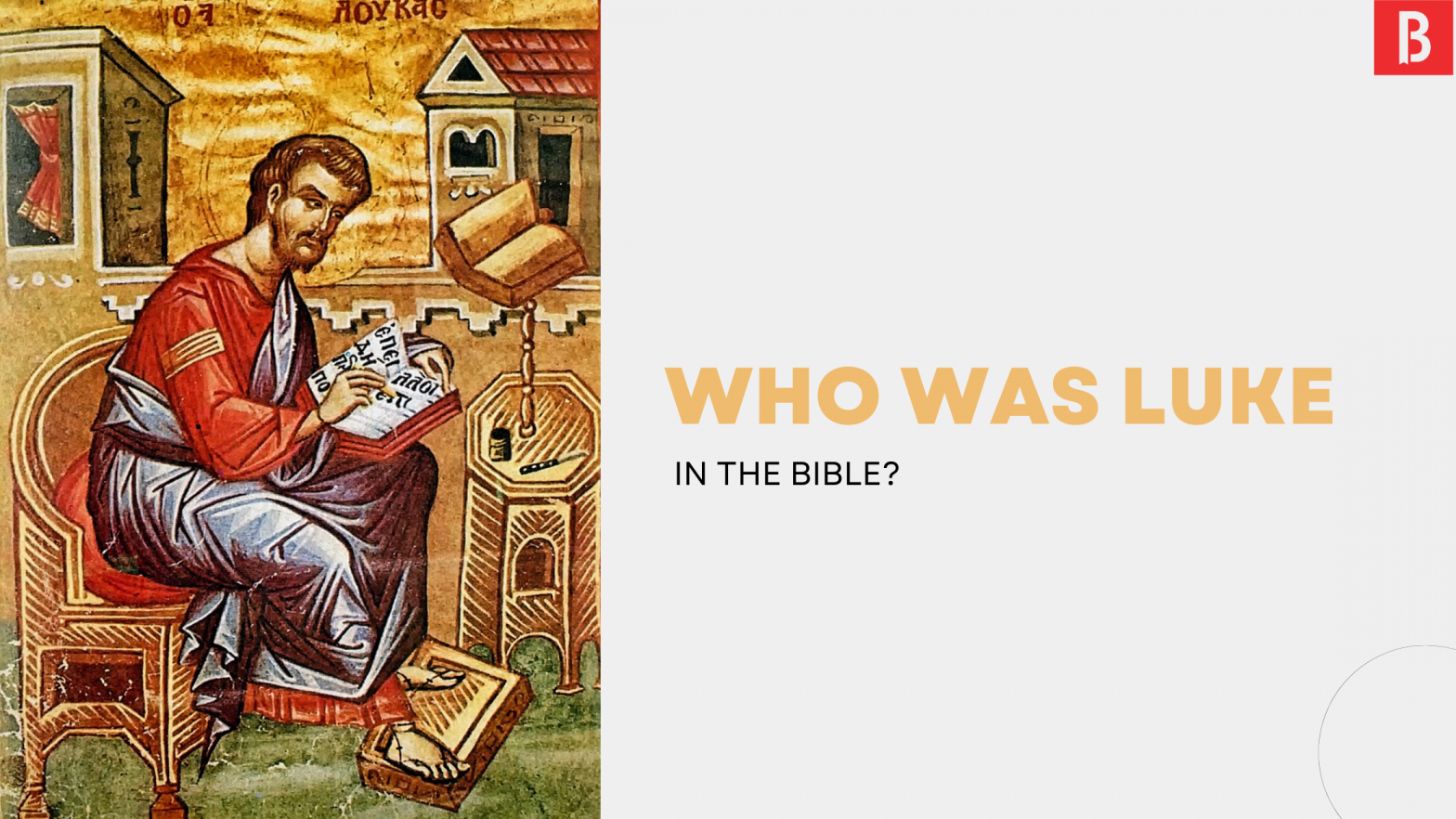
According to evidence from early records, Luke was a Gentile who was born in Antioch in Syria. By profession he was a doctor (Colossians 4:14), but he also became a skilled historian. His most memorable writing was a lengthy account of the development of Christianity from the birth of its founder to the arrival of its greatest missionary in Rome. The first part of this record is called Luke’s Gospel, the second part the Acts of the Apostles ( Luke 1:1-4; Acts 1:1-2). His writing accounts for 27.5% of the New Testament.
Luke first appears in the biblical record when he joined Paul and his party in Troas during Paul’s second missionary journey. This is shown by Luke’s inclusion of himself in the narrative – ‘we sought to go into Macedonia . . . we made a direct voyage’ ( Acts 16:10-11). Luke went with Paul to Philippi (Acts 16:12,16) and remained there when Paul and his party moved on (indicated by the use of ‘they’, not ‘we’, in Acts 17:1). It seems that Luke lived in Philippi for some time. When Paul passed through Philippi on his way to Jerusalem at the end of his third missionary journey, Luke rejoined Paul’s party. This is indicated by the renewed use of ‘us’ and ‘we’ in the narrative ( Acts 20:5-6).
From this time on, Luke kept close to Paul. This explains why the sea journey to Palestine and the events that followed in Jerusalem and Caesarea are recorded in some detail (Acts 20-26). Paul and his party were in Palestine for at least two years (Acts 24:27), and Luke no doubt used this time to gather information from eye-witnesses of the life of Jesus to include in his Gospel. He was a very thorough and discerning person, who was careful to see that his story of Jesus was meaningful and accurate (Luke 1:1-4).
Luke travelled with Paul on the eventful sea voyage to Rome ( Acts 27:1; Acts 28:16) and remained with him during his two years imprisonment there (Acts 28:30; Colossians 4:14; Philem 24). Although he was close to Paul throughout those years, Luke says almost nothing about himself in his record. He seems to have been a humble person, never self-assertive, but always dependable. When the aged Paul, after being released and later recaptured, sat cold and lonely in prison awaiting his execution, Luke alone stayed with him (2 Timothy 4:11). [Bridgeway Bible Dictionary]
1. Name:
The name Luke ( Λουκᾶς , Loukás, Lu’cas) is apparently an abbreviation for Λουκανός , Loukanós . Old Latin manuscripts frequently have the words Cata Lucanum as the title of the Third Gospel. It was a common fashion in the koı́nē to abbreviate proper names, as it is today, for that matter.
It is not to be confounded with Lucius, Acts 13:1; Romans 16:21, which belongs to a different person.
2. Mentioned Three Times by Name
Paul alone names Luke ( Colossians 4:14; 2 Timothy 4:11; Philemon1:24 ). He does not mention his own name in the Gospel or in the Acts. Compare the silence of the Fourth Gospel concerning the name of the apostle John. There was no particular occasion to mention Luke’s name in the Gospel, except as the author, if he had so wished. The late legend that Luke was one of the Seventy sent out by Jesus (Epiphanius, Haer ., ii. 51, 11) is pure conjecture, as is the story that Luke was one of the Greeks who came to Philip for an introduction to Jesus ( John 12:20 f), or the companion of Cleopas in the walk to Emmaus ( Luke 24:13 ). The clear implication of Luke 1:2 is that Luke himself was not an eyewitness of the ministry of Jesus.
3. A Gentile
In Colossians 4:14 Luke is distinguished by Paul from those “of the circumcision” (Aristarchus, Mark, Jesus Justus). Epaphras, Luke, Demas form the Gentile group. He was believed by the early Christian writers to have come directly from heathendom to Christianity. He may or may not have been a Jewish proselyte. His first appearance with Paul at Troas (compare the “we”-sections, Acts 16:10-12 ) is in harmony with this idea. The classic introduction to the Gospel ( Luke 1:1-4 ) shows that he was a man of culture (compare Apollos and Paul). He was a man of the schools, and his Greek has a literary flavor only approached in the New Testament by Paul’s writings and by the Epistle to the Hebrews.
4. Home
His home is very uncertain. The text of D (Codex Bezae) and several Latin authorities have a “we-“passage in Acts 11:27 . If this reading, the so-called B text of Blass, is the original, then Luke was at Antioch and may have been present at the great event recorded in Acts 13:1 f. But it is possible that the Western text is an interpolation. At any rate, it is not likely that Luke is the same person as Lucius of Acts 13:1. He certainly shows an interest in Antioch (compare Acts 11:19-27; Acts 13:1; Acts 14:26; Acts 15:22 , Acts 15:23 , Acts 15:30 , Acts 15:35; Acts 18:22 ). Antioch, of course, played a great part in the early work of Paul. Other stories make Luke live in Alexandria and Achaia and narrate that he died in Achaia or Bithynia.
But we know that he lived in Philippi for a considerable period. He first meets Paul at Troas just before the vision of the Man from Macedonia ( Acts 16:10-12 ), and a conversation with Paul about the work in Macedonia may well have been the human occasion of that vision and call. Luke remains in Philippi when Paul and Silas leave ( Acts 16:40 , “They … departed”). He is here when Paul comes back on his 3rd tour bound for Jerusalem ( Acts 20:3-5 ). He shows also a natural pride in the claims of Philippi to the primacy in the province as against Amphipolis and Thessalonica ( Acts 16:12 , “the first of the district”). On the whole, then, we may consider Philippi as the home of Luke, though he was probably a man who had traveled a great deal, and may have been with Paul in Galatia before coming to Troas. He may have ministered to Paul in his sickness there ( Galatians 4:14 ). His later years were spent chiefly with Paul away from Philippi (compare Acts 20:3-28, Acts 20:31 , on the way to Jerusalem, at Caesarea, the voyage to Rome and in Rome).
5. Physician
Paul ( Colossians 4:14 ) expressly calls him “the beloved physician.” He was Paul’s medical adviser, and doubtless prolonged his life and rescued him from many a serious illness. He was a medical missionary, and probably kept up his general practice of medicine in connection with his work in Rome. He probably practiced medicine in Malta ( Acts 28:9 f). He naturally shows his fondness for medical terms in his books (compare Hobart, The Medical Language of Luke ; Harnack, New Testament Studies: Luke the Physician , 175-98). Harnack adds some examples to those given by Hobart, who has overdone the matter in reality.
6. Brother of Titus
It is possible, even probable (see Souter’s article in Dcg ), that in 2 Corinthians 8:18 “the brother” is equivalent to “the brother” of Titus just mentioned, that is, “his brother.” If so, we should know that Paul came into contact with Luke at Philippi on his way to Corinth during his 2nd tour (compare also 2 Corinthians 12:18 ). It would thus be explained why in Acts the name of Titus does not occur, since he is the brother of Luke the author of the book.
7. Connection with Paul
If the reading of Codex Bezae (D) in Acts 11:27 f is correct, Luke met Paul at Antioch before the 1st missionary tour. Otherwise it may not have been till Troas on the 2nd tour. But he is the more or less constant companion of Paul from Philippi on the return to Jerusalem on the 3rd tour till the 2 years in Rome at the close of the Acts. He was apparently not with Paul when Philippians 2:20 was written, though, as we have seen, he was with Paul in Rome when he wrote Colossians and Philemon. He was Paul’s sole companion for a while during the 2nd Roman imprisonment ( 2 Timothy 4:11 ). His devotion to Paul in this time of peril is beautiful.
8. Author of Both Gospel and Acts
For the proof of the Lukan authorship of the Acts see Acts Of The Apostles . For the discussion of the Lukan authorship of the Gospel with his name, see Luke, Gospel Of. Our interest in him is largely due to this fact and to his relations with Paul. The Christian world owes him a great debt for his literary productions in the interest of the gospel.
9. Legends
One legend regarding Luke is that he was a painter. Plummer ( Commentary on Luke , 21 f) thinks that the legend is older than is sometimes supposed and that it has a strong element of truth. It is true that he has drawn vivid scenes with his pen. The early artists were especially fond of painting scenes from the Gospel of Luke. The allegorical figure of the ox or calf in Ezekiel 1 and Revelation 4:1-11 has been applied to Luke’s Gospel.
Literature.
Bible dicts., comms., lives of Paul, instroductions. See also Harnack, “Lukas, der Arzt, der Verfasser” (1906); New Testament Studies: Luke the Physician (1907); Ramsay, Luke the Physician (1908); Selwyn, Luke the Prophet (1901); Hobart, The Medical Language of Luke (1882); Ramsay, Was Christ Born at Bethlehem? A S tudy in the Credibility of Luke (1898); Maclachlan, John, Evangelist and Historian (1912).
Compiled by BiblePortal
